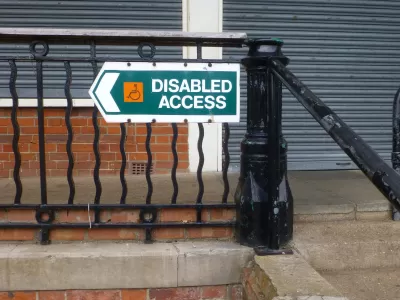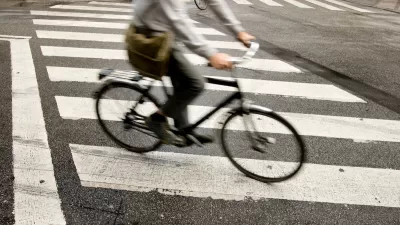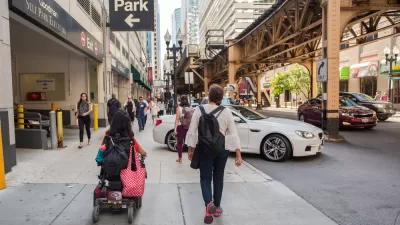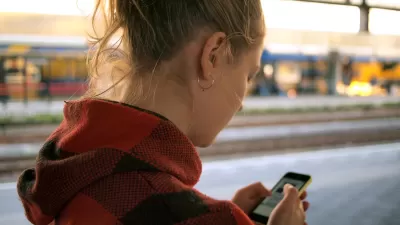Tech-focused civic partnerships may be one way to unlock greater urban mobility for disabled people. Tools in the works include navigation apps with specialized sound cues and "smart canes" that interact with invisible paint.

Katie Pyzyk covers a few partnership efforts seeking greater mobility for disabled urban residents, the blind in particular. She writes, "Difficulty with obtaining services and getting around a city can cause people with disabilities to not venture out into the world, and consequently, feel isolated. That problem is present enough on its own, but even more so when municipal innovations omit considerations for people with disabilities and make them feel like they can't keep up with the rest of society."
Because cities often don't have the resources to develop tech-based solutions to those problems, partnerships with the private sector and academia can be one way forward. "One targeted innovation for which researchers at Ohio State University seek more partnerships is a road paint that reacts with specially-designed tips on canes for the visually impaired. [...] Smart cane users will get a signal when their device touches the paint, indicating a boundary that could be dangerous to cross."
The city of Tampa is planning to pilot this "smart paint" during the coming months. Other projects involve apps like Microsoft's Soundscape, which uses audio cues to inform the visually impaired about their surroundings.
FULL STORY: The partnerships enabling disabled city residents to better explore their surroundings

Alabama: Trump Terminates Settlements for Black Communities Harmed By Raw Sewage
Trump deemed the landmark civil rights agreement “illegal DEI and environmental justice policy.”

Study: Maui’s Plan to Convert Vacation Rentals to Long-Term Housing Could Cause Nearly $1 Billion Economic Loss
The plan would reduce visitor accommodation by 25% resulting in 1,900 jobs lost.

Why Should We Subsidize Public Transportation?
Many public transit agencies face financial stress due to rising costs, declining fare revenue, and declining subsidies. Transit advocates must provide a strong business case for increasing public transit funding.

Wind Energy on the Rise Despite Federal Policy Reversal
The Trump administration is revoking federal support for renewable energy, but demand for new projects continues unabated.

Passengers Flock to Caltrain After Electrification
The new electric trains are running faster and more reliably, leading to strong ridership growth on the Bay Area rail system.

Texas Churches Rally Behind ‘Yes in God’s Back Yard’ Legislation
Religious leaders want the state to reduce zoning regulations to streamline leasing church-owned land to housing developers.
Urban Design for Planners 1: Software Tools
This six-course series explores essential urban design concepts using open source software and equips planners with the tools they need to participate fully in the urban design process.
Planning for Universal Design
Learn the tools for implementing Universal Design in planning regulations.
Caltrans
Smith Gee Studio
Institute for Housing and Urban Development Studies (IHS)
City of Grandview
Harvard GSD Executive Education
Toledo-Lucas County Plan Commissions
Salt Lake City
NYU Wagner Graduate School of Public Service





























